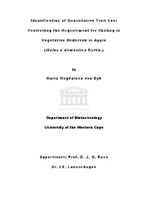Identification of quantitative trait loci control l ing the requirement for chilling in vegetative budbreak in apple (malus x domestica borkh.)
Abstract
The domesticated apple (Malus x domestica Borkh.) has been distributed into diverse climatic conditions worldwide for commercial production of fruit. Apple trees need exposure to cold temperatures, referred to as chill unit (CU) accumulation during winter, in order for budbreak to occur promptly and uniformly after winter. In warmer production areas the application of dormancy breaking chemicals has enabled successful production of high chilling requiring apple cultivars in suboptimal environmental conditions. In the Western Cape region of South Africa it is common orchard practice to apply dormancy breaking chemicals after winter in order to stimulate vegetative growth. If this is not done prolonged dormancy symptoms (PDS) are experienced which include extended rest, less
synchronised breaking of buds and reduced branching. An increasing awareness of both global warming and the negative effects associated with the use of chemical sprays (for both pest and disease resistance and growth regulation) has resulted in the need to breed cultivars better adapted to current and future environmental conditions. The breeding of new cultivars using conventional breeding methods is
a time consuming process, especially in perennial tree species with a long
juvenile phase such as apple. The implementation of marker-assistedbreeding
(MAB) and selection (MAS) will enable the selection of favourable genotypes at a very early seedling stage. Although markers linked to genes involved in disease resistance for a variety of known apple pathogens have been identified and are already in use in breeding programs, the genetic determinants of dormancy related characteristics residing within the bud itself iii (endodormancy) are poorly understood. This hampers the genetic improvement of such characters. Although this study focused on time of initial vegetative budbreak IVB, there are various other characteristics that can be associated with dormancy, such as position and number of budbreak and budbreak duration.

